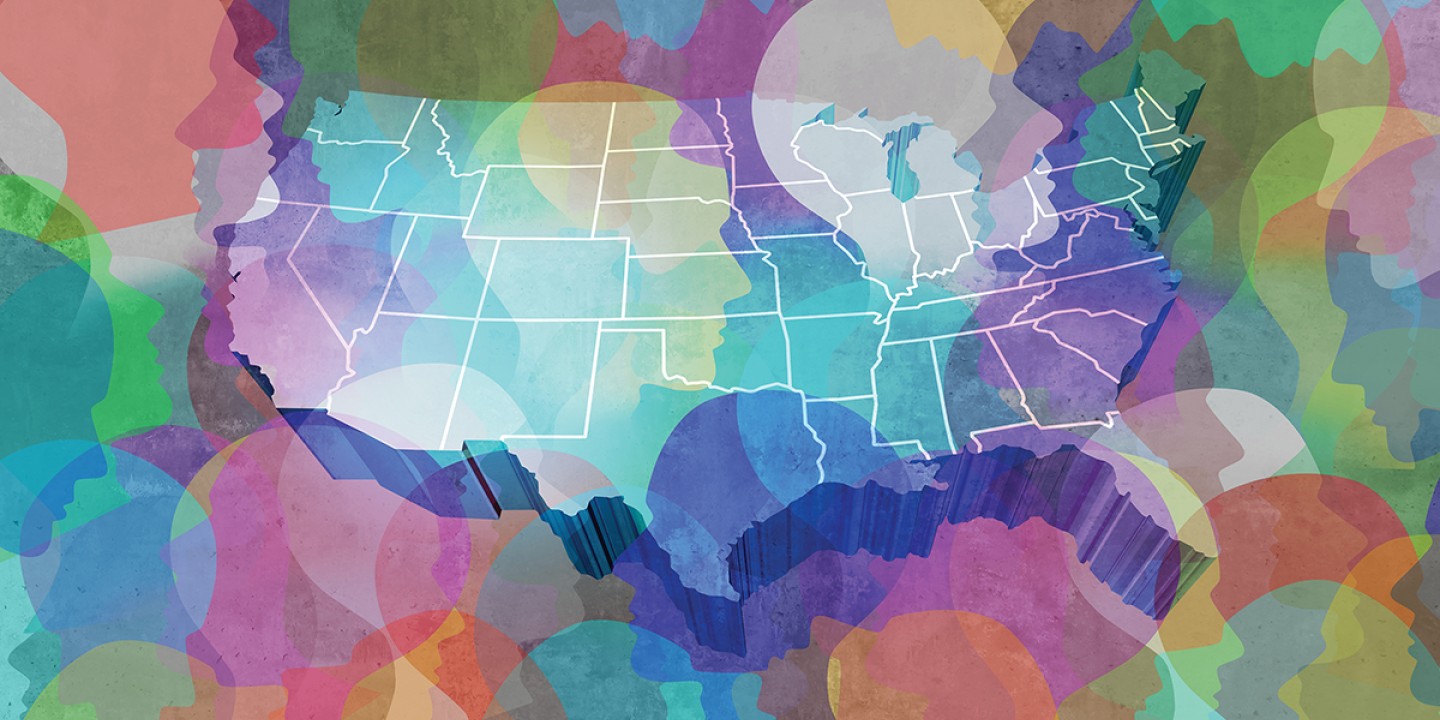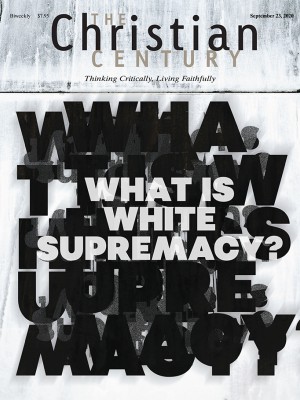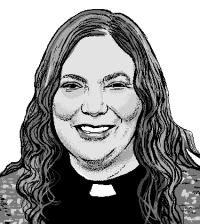The 2020 Census and the daughters of Zelophehad
The book of Numbers reminds us why it matters who we count.

Donald Trump’s obsession with numbers became evident immediately following his inauguration. He and his press secretary, Sean Spicer, insisted repeatedly that the event drew the largest numbers ever, despite contrary evidence. Even in moments when one might expect the presidential focus to be elsewhere, such as while visiting Texas communities devastated by Hurricane Harvey, Trump’s eyes were aglisten with the inflated numbers: “What a crowd, what a turnout!”
Honestly, this is one area where I identify with Trump. Pastors are conditioned to be obsessed with numbers too. We have to turn in annual reports filled with numbers. How many baptisms? How many confirmations? How many people in the pews each Sunday? How many people under 30? Over 60? Children? Then we move to the financial figures: How many dollars pledged this year? Given? Spent?
Read our latest issue or browse back issues.
For the church—and for Trump—numbers determine survival, tempting us to massage them a bit. If nobody records a head count some Sunday, then I’ll just estimate—and perhaps my memory will swell the ranks. Should a very pregnant woman count as one person or two? Hopefully the usher didn’t count early in the service, since maybe 35 people rolled in late. I won’t go into the invisible presence of the communion of saints who surround us—but I have considered counting them. I’m hardly in a position to judge Trump’s preoccupation with numbers.
Numbers are in the news more than ever, thanks to the 2020 Census—and the contention around the data it collects. Under President Obama, several federal agencies asked the Census Bureau to include questions about sexual orientation and gender identity. Soon after Trump took office those questions were removed, and no amount of outcry from LGBTQ activists has changed that. Advocacy groups need numbers because statistics about the queer community bear on statewide organizations and local community centers’ planning.
Trump has tried to erase LGBTQ people in other ways too. Just two months after his inauguration, he sought to remove data on LGBTQ persons from the annual national survey of those who receive services—nutritional service, transportation, and the use of senior centers—through the Older Americans Act. Queer older adults face systemic discrimination resulting in disproportionate levels of economic insecurity and social isolation. Data on how these safety net programs serve—or fail to serve—LGBTQ older adults (which has been collected and used since 2014) is no longer part of the survey.
Similarly, the Department of Justice has sought to raise the age (from 16 to 18) of crime victims who can be asked if they have been a victim due to sexual orientation or gender identity. This is a voluntary question—no young person is forced to disclose anything they wish to keep private—but in the past, many have chosen to reveal that they were targeted for reasons of sexual orientation or because they are transgender. Those who wish to support queer teens and reduce the frequency of such attacks need these numbers.
And Secretary of Education Betsy DeVos has removed questions related to gender expression or sexual orientation from the data collection about students who are bullied in public schools. Eliza Byard, who worked for years to get the Department of Education to have the agency count incidents of bullying because of perceived sexual orientation or gender expression, says, “For people who don’t want to act on these issues, they don’t want to see the problem, and it [has] the effect of erasing specific incidents at the top level of our data collection.”
Trump has no interest in these numbers, which are essential to improving policies and protections for the queer community. It’s easier to minimize the presence of LGBTQ persons in our nation if we have no real numbers available.
Trump is, however, eager to count undocumented immigrants. He was quite displeased when the courts recently determined that the federal government could not legally ask people whether they are US citizens as part of the 2020 Census. Although federal law states that individual data from the census cannot be shared with other governmental agencies (and therefore cannot be used to track people down for deportation), that law has been circumvented before. Such data helped the government round up and imprison Japanese Americans in World War II. What reason have people to trust that something similar will not happen again? Undocumented immigrants often choose to avoid the census, so their numbers are unknown.
Those who live in precarious housing situations also sometimes wish to evade the census, for fear of calling attention to their questionable living arrangements and thus becoming homeless. People who live in public housing sometimes open their doors to family members or friends in urgent need of housing. But those who live in an apartment and use a Section 8 housing voucher are allowed to host a guest for only 14 consecutive days and no more than 21 nights total in any one year. These rules apply even to close relatives (such as a parent, sibling, child, or grandchild) if they were not part of the original household upon application. A person found guilty of housing others without permission can be legally accused of fraud, be evicted, and lose the option for a future Section 8 voucher. All of this provides reason enough to make people in such situations leery of the census.
Of course, many people who live in precarious housing arrangements are immigrants. Shortly after I started my ministry at Manhattan’s Trinity Lutheran Church, I walked around my new neighborhood and wondered where the Mexican immigrants lived. Most of the housing options I noticed—public housing, rent-stabilized apartments, and pricy condos—seemed unlikely. I found my answer a few months later when I went to visit the families of the children who attended our summer camp.
One address was less than a block from the church. It was a large building that rented rooms to tourists on some floors and to families on others. When I visited the Ramirez family, I stepped into a nine-by-nine-foot room with a bunk bed, dresser, chair, and little table. The parents slept on the bottom bunk and their two daughters shared the top. They didn’t have a kitchen. Many families used a communal bathroom in the hall. Juana and Carlos endured the challenges of this small living space because it enabled their girls to attend better schools than those in neighborhoods with cheaper rents.
My next visit to a camper’s family took me to the kind of classic Upper West Side prewar building that filmmakers love. I couldn’t figure out how our day-camp family could afford it. Then I learned that the super had carved out a bonus for himself by illegally renting space in the boiler room. Getting into the family’s makeshift living space required descending a steep stairway meant for boiler maintenance, not for parents with small children lugging groceries, laundry, and strollers. The only way in, or out, was through a thick, fireproof door that was required to remain closed at all times. It was July, but despite the oppressive heat outside and lack of ventilation inside, the space stayed relatively cool, a singular advantage to living underground.
The mother offered cold orange soda from the jury-rigged refrigerator, and the children, suddenly shy, pointed to their colorful assortment of day-camp artwork on a dresser. Upstairs, the tenants enjoyed airy, ornamented apartments with high ceilings, large windows, herringbone wooden floors, vintage brass fixtures, and wide hallways. On the other hand, the Virgin of Guadalupe had a place of honor on the wall of the boiler room.
City law says that all living spaces must have windows and that all cellar dwellings are illegal, but when you have no other options, you make do. Countless families like these are part of the fabric of our nation, doing jobs that others decline to do, but they are not likely to be counted in a census.
One of my favorite lesser-known Bible stories comes from the book of Numbers. Numbers gets its name from the census God orders Moses to take in the second verse of the book, and census numbers thread throughout. The passage I especially love comes from chapters 26 and 27. The Israelite tribes have been making their way through the wilderness since leaving their enslavement in Egypt. They now stand on the plains of Moab, with their destination ahead of them, on the other side of the Jordan River.
When these sojourners face the challenge of reorganizing for life across the Jordan River, they begin by taking a census (the second census described in Numbers). In addition to numbers, this census includes names. Each of the 12 tribes of Israel is named, and each tribe has three to six clans with their own named heads. The Bible gives the total figures for each tribe, and if you add them up, the Numbers census counts 601,730 people, none of them named except for the tribal and clan heads.
But the group gathered on the plains of Moab is much bigger than that, because the census did not include women and children. The first purpose of the census was to determine battle readiness. Only those who were seen as fit to fight battles were counted. The second purpose of the census was to determine how to distribute the land. Larger clans needed more land and smaller clans needed less. Property rights were passed on through males of each clan.
In the context of the book of Numbers, the invisibility of women and children in the census is not surprising. What is astonishing is what we find as we move through the list of tribes in Numbers 26 and come to the eighth tribe, the tribe of Manasseh: “The descendants of Manasseh: of Machir, the clan of the Machirites; and Machir was the father of Gilead; of Gilead, the clan of the Gileadites” (Num. 26:29), and on and on until we hit verse 33: “Now Zelophehad son of Hepher had no sons, but daughters: and the names of the daughters of Zelophehad were Mahlah, Noah, Hoglah, Milcah, and Tirzah.”
It’s not remarkable that women are excluded from the census. It’s remarkable that five women are named in the census. And not only are they named; their speech is recorded:
They stood before Moses, Eleazar the priest, the leaders, and all the congregation, at the entrance of the tent of meeting, and they said, “Our father died in the wilderness; he was not among the company of those who gathered themselves together against the Lord in the company of Korah, but died for his own sin; and he had no sons. Why should the name of our father be taken away from his clan because he had no son? Give to us a possession among our father’s brothers.” (Num. 27:2–4)
Zelophehad had died on the sojourn in the wilderness. The five sisters had no brothers, husbands, or in-laws, and therefore no rights to any land. They stood together with their people on the edge of the wilderness, but the census made clear that they didn’t count for anything.
When everyone crossed over, they would remain forever on the far edge, disconnected from power, from land, and from life. While the rest of the group mobilized itself through the census to determine critical mass for battles on the other side of the Jordan, these five sisters saw a battle to fight right where they stood, within their own community.
And the battle came with real risk. Would “Moses, Eleazar the priest, the leaders, and all the congregation” really hear the justice of their claim? As vulnerable women without men, they had the most to lose if the community rejected them—and rejection was quite likely if they agitated the leadership.
Moses’ own sister Miriam had been censured earlier for daring to question her brother’s position as spokesman and community advocate. In reaction to Miriam’s suggestion that she and her brother Aaron should also have leadership roles in the community, she became covered with leprosy and had to be shut away for a week in order to learn her lesson. (Notably, Aaron had joined Miriam in her questioning, but he was not turned leprous.) This was not an encouraging example for Mahlah, Noah, Hoglah, Milcah, and Tirzah.
But these five sisters spoke out anyway. It would have been much less risky to approach Moses in private and plead with him to work out some special deal for them. But they understood that their well-being was connected to the well-being of others, so they made their case in public, as a witness and inspiration to others.
Moses brought their case before the Lord. And the Lord spoke to Moses, saying: The daughters of Zelophehad are right in what they are saying; you shall indeed let them possess an inheritance among their father’s brothers and pass the inheritance of their father on to them. . . . It shall be for the Israelites a statute and ordinance, as the Lord commanded Moses. (Num. 27:5–7, 11b)
Because Mahlah, Noah, Hoglah, Milcah, and Tirzah present their petition to Moses in public, their individual case serves to change the Israelite inheritance law. These sisters filed one of the earliest lawsuits on record. In fact, this case is one of the oldest still cited as an authority. As recently as 1924, the American Bar Association Journal cites Numbers 27, describing Mahlah, Noah, Hoglah, Milcah, and Tirzah’s win as “an early declaratory judgment in which the property rights of women are clearly set forth.”
For Mahlah, Noah, Hoglah, Milcah, and Tirzah, census taking turned into an opportunity for power, the redistribution of wealth, and the empowerment of women. There have been times in American history when it has been clear that the census can be used similarly—just as it can be used to minimize and disregard those on the margins. That’s why, to take just one example, there were heated debates in 1930 about how well the census counted people who were unemployed.
A well-executed census could show how serious unemployment was, determine where it was concentrated, and thus imply responses that business and government might be compelled to offer. Counting, as Trump understands, is never neutral.
I don’t think it’s any coincidence that, as the Gospel of Luke tells us, Jesus was born during a census. God came to earth not only in a manger; God came to earth during the season of counting. Every time I read a newspaper article about the census, every time I hear the president on the news inflating his numbers, I am reminded that we can put our own counting toward various ends. For women, for the dispossessed, for immigrants, for the precariously housed, for queer people, for all of us, our counting can advance—or it can prevent—the kind of community Jesus always seeks.
This article is adapted from Heidi Neumark’s forthcoming book Sanctuary: Being Christian in the Wake of Trump, published this month by Eerdmans. Used by permission. A version of this article appears in the print edition under the title “Who do we count?”






